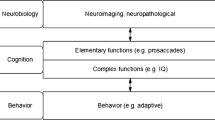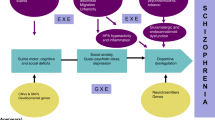Abstract
Studies in twins demonstrate major genetic influences in the development of alcohol use disorders (AUD) such as addiction. Candidate studies and genome-wide association studies (GWAS) have identified numerous candidate genes for excessive alcohol consumption and AUD. Here we present a convergent functional genetics approach which is a translational methodology that integrates multiple lines of evidence from studies in human and animal models to get a better understanding of the genetics of AUD.
Similar content being viewed by others
Literatur
Spanagel R (2009) Alcoholism: a systems approach from molecular physiology to addictive behavior. Physiol Rev 89:649–705
Breen G, Li Q, Roth BL et al. (2016) Translating genome-wide association findings into new therapeutics for psychiatry. Nat Neurosci 19:1392–1396
Sommer W, Spanagel R (Hrsg) (2013) Behavioral Neurobiology of Alcohol Addiction. Springer, Berlin
Sullivan PF, Daly MJ, O’Donovan M (2012) Genetic architectures of psychiatric disorders: the emerging picture and its implications. Nat Rev Genet 13:537–551
Hill DR, Bowery NG (1981) 3H-baclofen and 3H-GABA bind to bicuculline-insensitive GABA B sites in rat brain. Nature 290:149–152
Zindel LR, Kranzler HR (2014) Pharmacotherapy of alcohol use disorders: seventy-five years of progress. J Stud Alcohol Drugs 75 Suppl 17:79–88
Addolorato G, Leggio L, Ferrulli A et al. (2007) Effectiveness and safety of baclofen for maintenance of alcohol abstinence in alcohol-dependent patients with liver cirrhosis: randomised, double-blind controlled study. Lancet 370:1915–1922
Spanagel R (2013) Convergent functional genomics in addiction research–a translational approach to study candidate genes and gene networks. In Silico Pharmacol 1:18
Schumann G, Coin LJ, Lourdusamy A et al. (2011) Genomewide association and genetic functional studies identify autism susceptibility candidate 2 gene (AUTS2) in the regulation of alcohol consumption. Proc Natl Acad Sci USA 108:7119–7124
Roussotte FF, Gutman BA, Hibar DP et al. (2013) A single nucleotide polymorphism associated with reduced alcohol intake in the RASGRF2 gene predicts larger cortical volumes but faster longitudinal ventricular expansion in the elderly. Front Aging Neurosci 5:93
Stacey D, Bilbao A, Maroteaux M et al. (2012) RASGRF2 regulates alcohol-induced reinforcement by influencing mesolimbic dopamine neuron activity and dopamine release. Proc Natl Acad Sci USA 109:21128–21133
Juraeva D, Treutlein J, Scholz H et al. (2015) XRCC5 as a risk gene for alcohol dependence: evidence from a genome-wide geneset-based analysis and follow-up studies in Drosophila and humans. Neuropsychopharmacology 40:361–371
Joslyn G, Ravindranathan A, Brush G et al. (2010) Human variation in alcohol response is influenced by variation in neuronal signaling genes. Alcohol Clin Exp Res 34:800–812
Author information
Authors and Affiliations
Corresponding authors
Additional information
Jens Treutlein1992–1998 Biologiestudium in Heidelberg. 1999–2002 Doktorarbeit (PhD) am Institut für Pharmazie und Molekulare Biotechnologie (IPMB), Universität Heidelberg. 2002–2003 Postdoc am Institut für Pharmazie und Molekulare Biotechnologie, Universität Heidelberg. Seit 2004 wissenschaftlicher Mitarbeiter im molekulargenetischen Labor, Abteilung Genetische Epidemiologie in der Psychiatrie, Zentralinstitut für Seelische Gesundheit, Mannheim.
Rainer Spanagel 1982–1989 Biologiestudium in Tübingen und München. 1989–1991 Doktorarbeit (PhD) am Max-Planck-Institut (MPI) für Psychiatrie, Martinsried (Abteilung Neuropharmakologie). 1991–1995 Postdoc am MPI für Psychiatrie, Klinisches Institut, München. 1996–1999 Leiter der Arbeitsgruppe Suchtforschung am MPI für Psychiatrie. 1996–1997 Habilitation an der LMU München. 2000–2011 Professur für Psychopharmakologie und Abteilungsleiter der Psychopharmakologie am Zentralinstitut für Seelische Gesundheit, Mannheim; dort seit 2011 wissenschaftlicher Direktor des Instituts für Psychopharmakologie.
Rights and permissions
About this article
Cite this article
Treutlein, J., Spanagel, R. Genetische Aspekte bei Alkoholismus. Biospektrum 24, 260–263 (2018). https://doi.org/10.1007/s12268-018-0916-7
Published:
Issue Date:
DOI: https://doi.org/10.1007/s12268-018-0916-7




